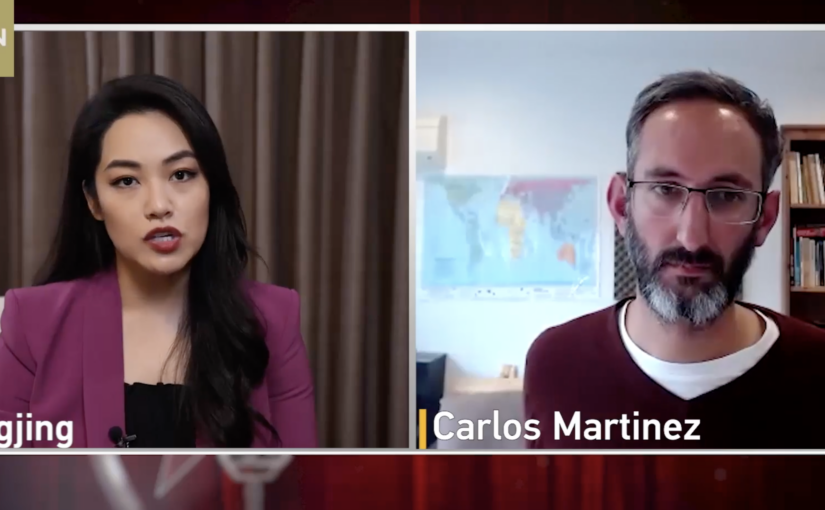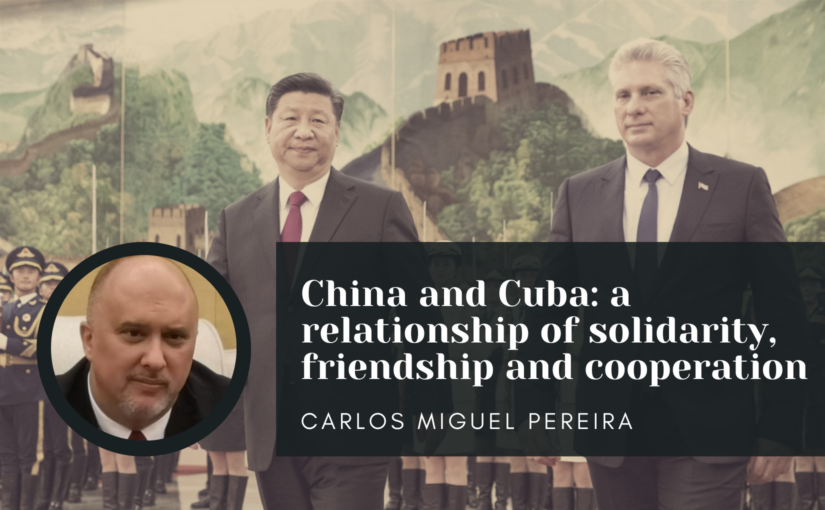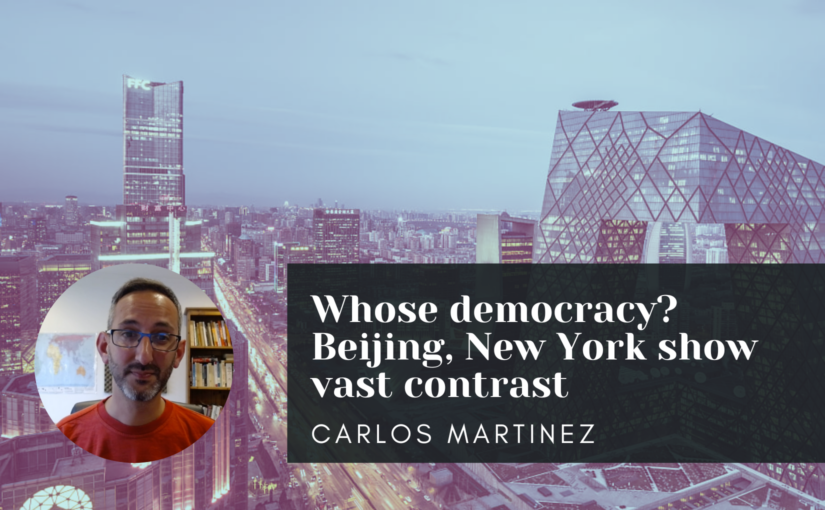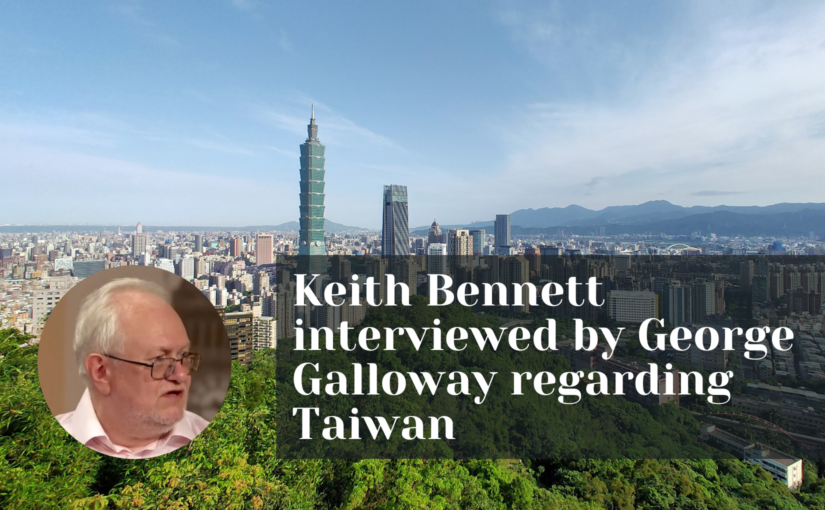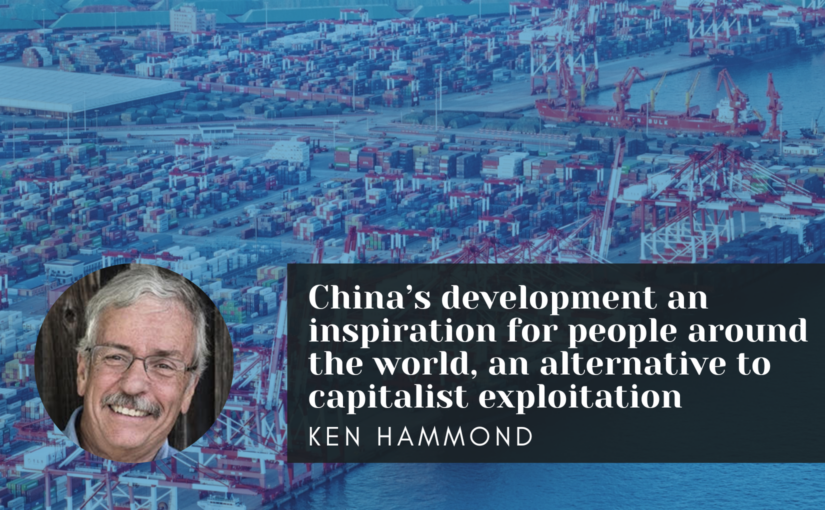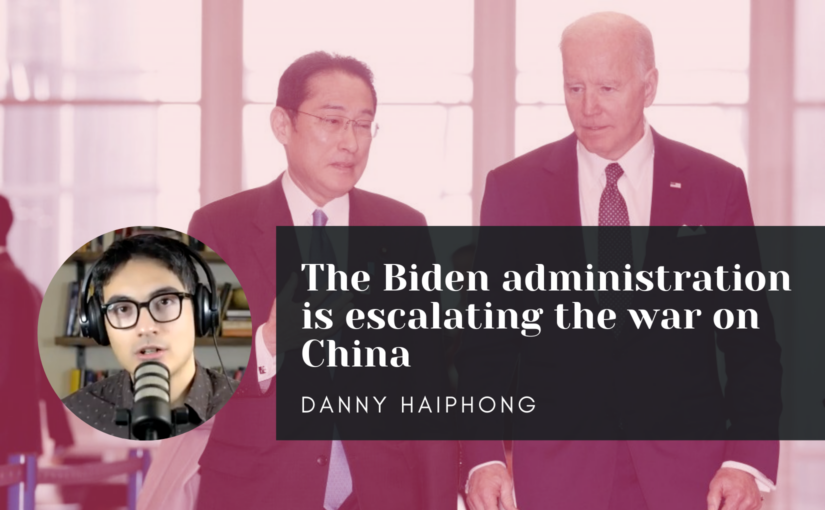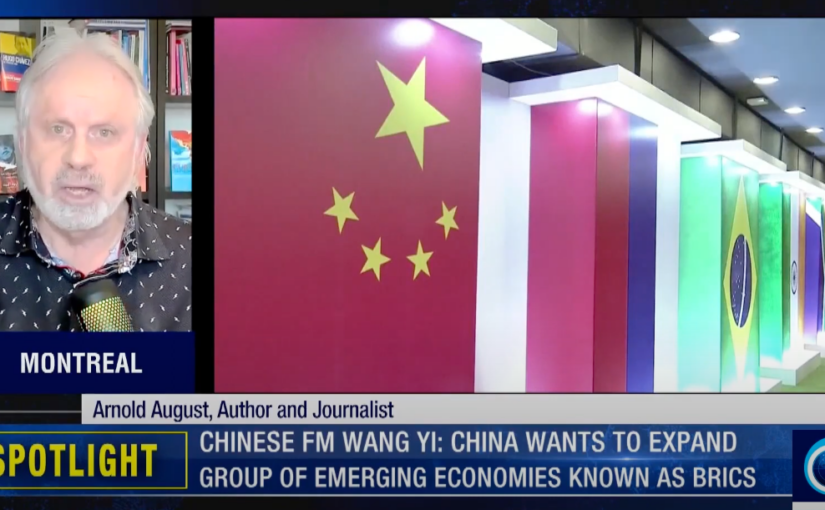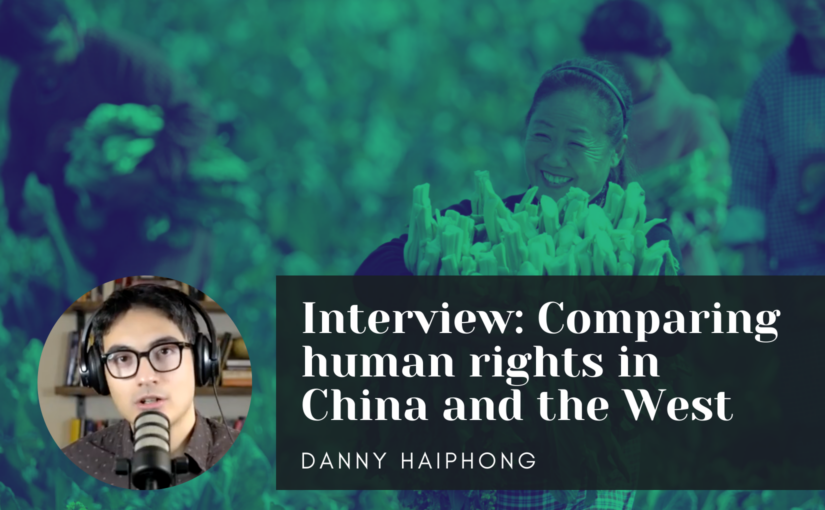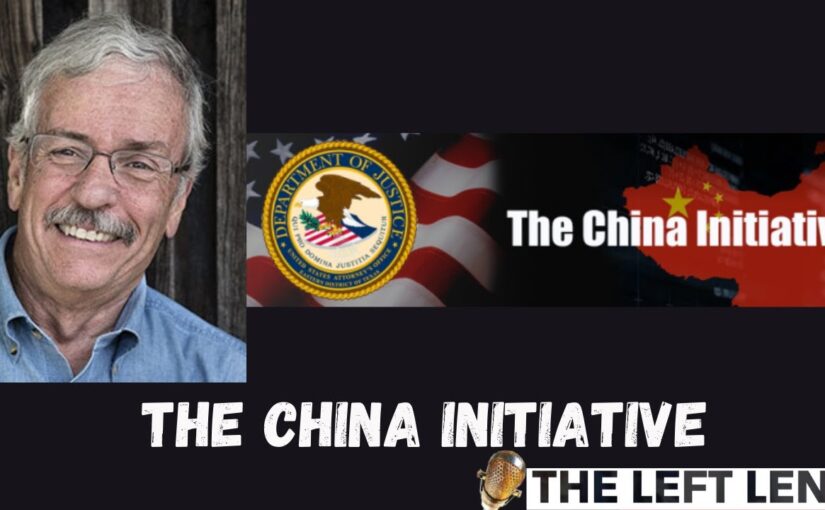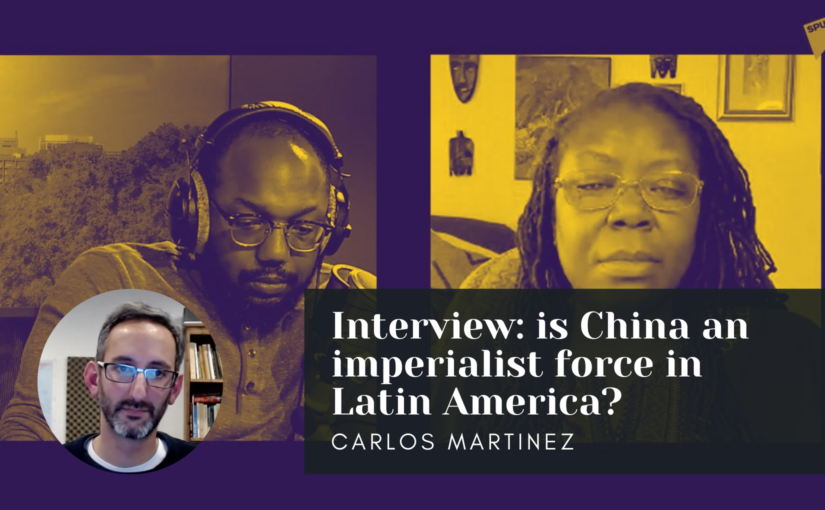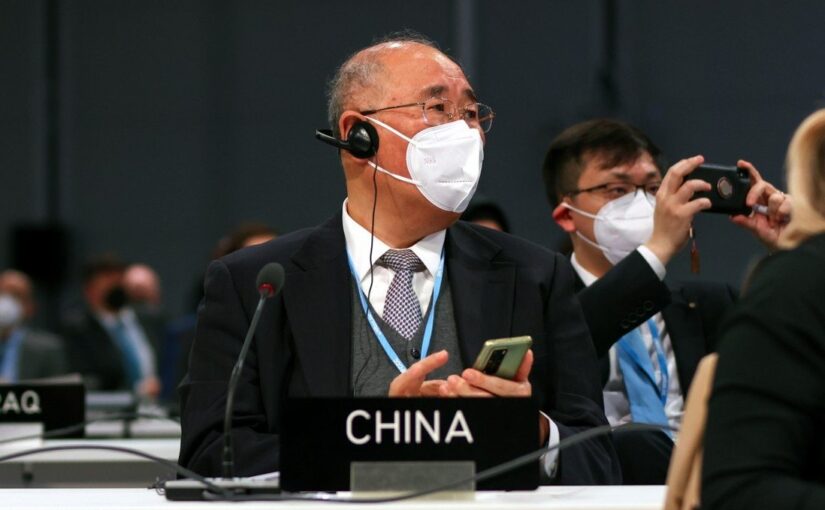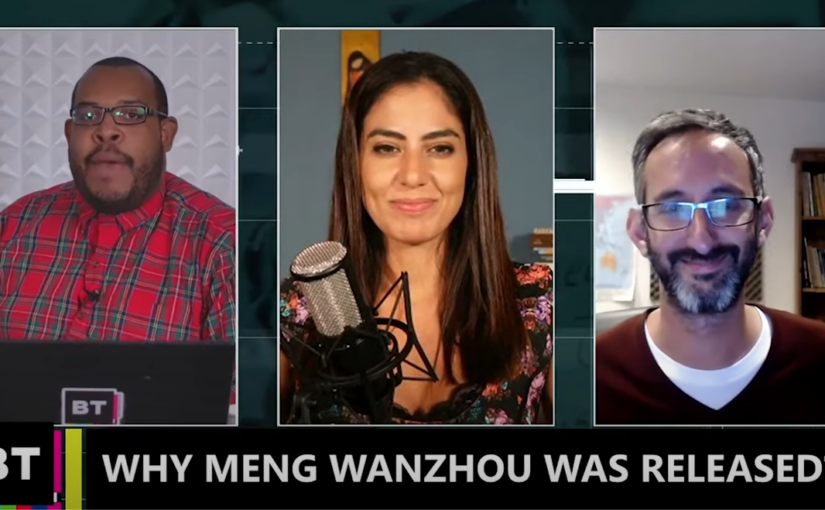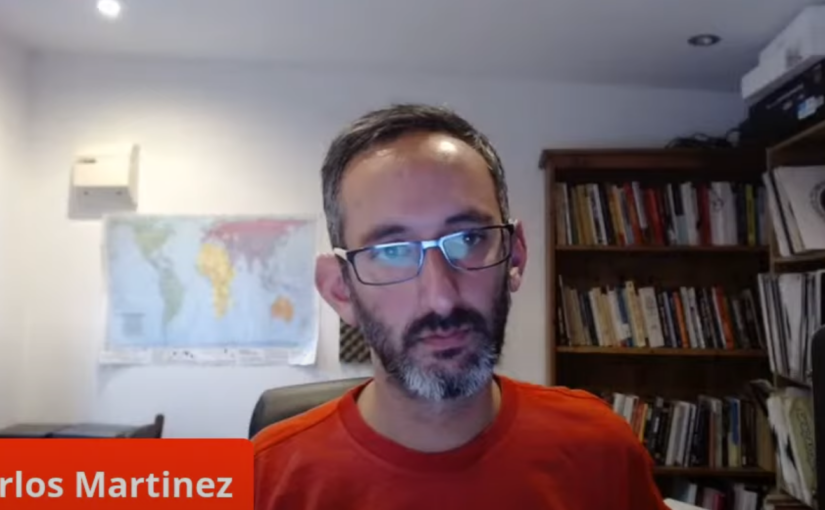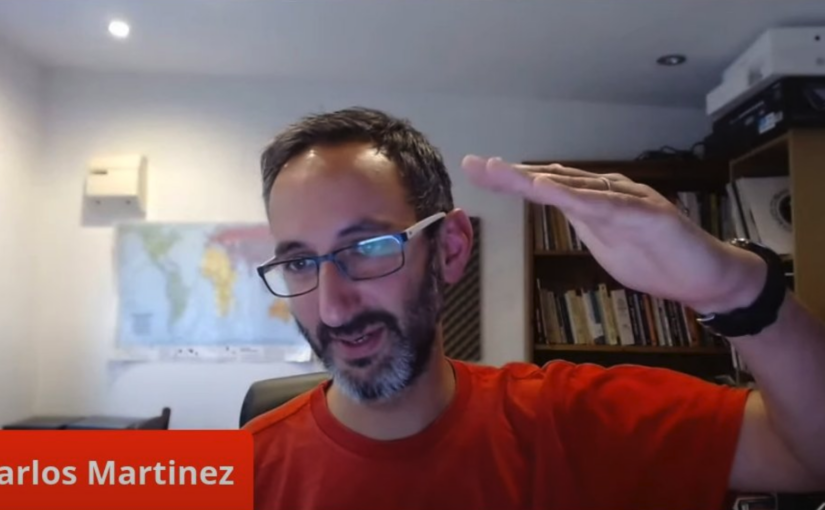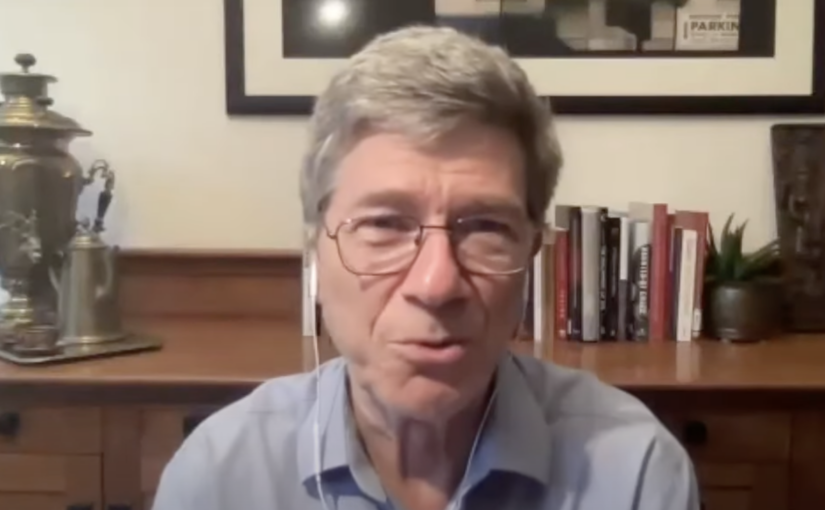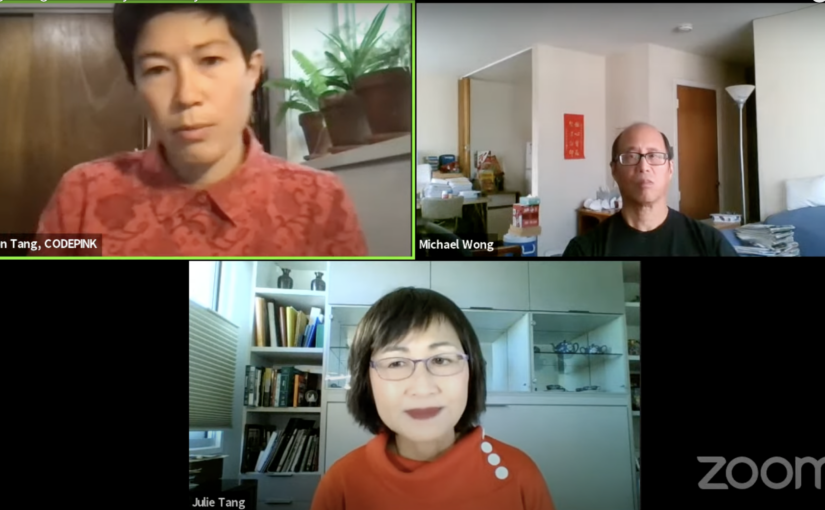In the video below, originally carried on CGTN, Li Jingjing interviews Carlos Martinez about the recently-concluded 20th National Congress of the CPC – in particular its focus on common prosperity – as well as the successes of China’s development model.
Carlos outlines the core principles of common prosperity – reducing poverty, reducing inequality, improving distribution, and increased regulation of capital. He highlights in particular the measures that have already been taken in support of workers in the ‘gig economy’, including recent legislation supporting and encouraging unionisation, and mandating that all workers have proper contracts and full insurance entitlement. These measures compare very favourably with the situation in the West, where casual workers face terrible working conditions, zero-hour contracts and anti-union policies.
Discussing China’s development model of Socialism with Chinese Characteristics, Carlos points out that the successes of this model speak for themselves. It is a model that has been able to eliminate extreme poverty in a huge country of 1.4 billion people – an unprecedented achievement. “Anyone saying it’s a bad model is saying that it’s bad for people who used to face famines to now live comfortable lives.”
Category: Interviews
China and Cuba: a relationship of solidarity, friendship and cooperation
We are very pleased to publish below an interview with Carlos Miguel Pereira Hernández, Cuba’s ambassador to China, conducted by People’s Daily and published in Chinese on 13 October. The unabridged English translation has been provided to us by the Cuban Embassy in Beijing.
Timed to coincide with the 62nd anniversary of the establishment of diplomatic relations between the Republic of Cuba and the People’s Republic of China, the interview gives an overview of the history and contemporary reality of relations between the two countries.
Noting that revolutionary Cuba was the first country in the Western hemisphere to extend diplomatic recognition to the People’s Republic of China – in 1960, just a year after the 26th of July Movement came to power – Pereira references the role played by Chinese immigrants in Cuba’s independence struggle. He points out that Cuba and China consider themselves “mutual referents in the construction of socialism with our own characteristics” and notes that President Miguel Díaz-Canel describes Cuba-China ties as “paradigmatic”, and President Xi Jinping describes them as those of “good friends, good comrades and good brothers”.
Describing the cooperation between China and Cuba fields in a vast array of fields, Comrade Pereira expresses confidence that the relationship will continue to deepen.
This year marks the 62nd anniversary of the establishment of diplomatic relations between China and Cuba, how do you assess the fraternal friendship between the two countries? What are your specific plans to further promote economic, trade and people-to-people exchanges between the two countries?
Relations between Cuba and China were made official on September 28, 1960, a formal step after the announcement by Commander in Chief Fidel Castro a few days earlier in front of more than a million Cubans, in the context of the historic First Declaration of Havana, to recognize the New China and rescind ties with Taiwan. That just decision was born of the political and popular will that have accompanied our relations throughout these 62 years.
The nascent Cuban Revolution definitively broke with the Monroe Doctrine and blind obedience to Washington, allowing Cuba to become the first country in the entire Western Hemisphere to establish ties with New China. We are honored to have made that modest contribution as one of the first manifestations of independence from our foreign policy.
The historical foundations and deep bonds of friendship between our peoples go back to the arrival of those first Chinese immigrants 175 years ago, who also had an outstanding and glorious participation in our struggles for independence.
Throughout these years of uninterrupted relations, Cuba has had the historic privilege of always being in the front row in promoting exchanges with China. Our relations represent a model of cooperation based on equality, respect and mutual benefit. We consider ourselves mutual referents in the construction of socialism with our own characteristics and on that basis, we carry out a broad and systematic exchange of experiences.
Continue reading China and Cuba: a relationship of solidarity, friendship and cooperationCapitalism’s senility and socialism’s vigor are increasingly apparent to world
We are pleased to republish this important interview with Professor Radhika Desai, Convenor of the International Manifesto Group and member of our advisory group, originally published by Global Times. The focus of the interview is the ever more stark demarcation between stagnating western capitalism and booming socialist China.
Analysing the turn to neo-liberalism, particularly in the wake of the 2008 global financial crisis, Radhika asserts: “Liberal democracy is a contradiction in terms… Capitalism is not in the interests of the vast majority of working people.”
Questioned on the premise of earlier Western engagement with China, and its expectation that it would lead to the demise of socialism, Radhika notes: “China’s development is entirely attributed to the country’s adherence to socialism, both in the early period under Mao and in the later reform and opening-up period… After reform and opening-up, the US stepped up economic engagement with China and the idea, particularly after the end of the Soviet Union in 1991, was that such engagement would also make China more or less capitalist, even neoliberal. However, for China this engagement was only another means to advance socialism… Capitalism’s senility and socialism’s vigor are increasingly apparent.”
For the Chinese people, the past decade has been epic and inspirational. The country, under the leadership of the CPC Central Committee with Comrade Xi Jinping at the core, has made great endeavors in boosting its economy, deepening reforms, improving the rights of its people and acting as a responsible power globally.
The world has been increasingly turbulent in recent years due to multiple crises triggered by the US-led West, while there is an obvious tendency that the West is more and more difficult to maintain its development momentum like in the last century. After the 2008 financial crisis, economic growth in Western countries has remained low, in stark contrast to China’s boom. Global Times (GT) reporter Yan Yuzhu talked to Radhika Desai (Desai), convenor of International Manifesto Group and professor of political studies at the University of Manitoba in Canada, about her opinion toward the weakness of capitalism, the adverse consequences of neoliberalism for Western development, as well as China’s role in making a way to pluripolarity.
This is the 25th of the series about this special decade.
GT: After the 2008 financial crisis, especially in the last decade, economic growth in the West has remained very low and the crisis of their domestic political system has been highlighted time and again. In contrast, China has maintained a relatively stable momentum of development, and the gap between China and the US has gradually narrowed. What do you think are the reasons for this difference?
Desai: The low economic growth of major capitalist countries since 2008 is the result of the turn to neoliberalism. It never managed to restore the growth of the 1970s. It occurred because production had outstripped demand and, rather than solving the demand problem, neoliberalism only made it worse. Its attack on organized labor and social spending restricted consumption demand while its encouragement towards financial and rentier activity reduced investment demand, siphoning away funds into speculation and predatory activity. The attempt to compensate for low demand, low growth and low government revenues by extending credit to consumers and governments has only led to mountains of debt and asset bubbles that have regularly burst, weakening economies further.
This process has been ongoing for more than four decades. At the start, the major capitalist countries were much healthier thanks to their “golden age” of robust growth and the broad-based distribution of incomes. But over time, the disastrous effects of neoliberal policies were assailing ever weaker economies.
Continue reading Capitalism’s senility and socialism’s vigor are increasingly apparent to worldVideo: Whose democracy? Beijing, New York show vast contrast
The video embedded below is the last in a three-part series on democracy made by China Daily, based on an interview with Friends of Socialist China co-editor Carlos Martinez. In this segment, Carlos talks about visiting both New York City and Beijing for the first time in 2019, and the stark contrast between the two cities. New York, in spite of being a major centre of wealth, contains terrible levels of poverty, inequality, homelessness and discrimination, and its infrastructure is collapsing. Beijing on the other hand is modern, efficient, clean and well-organised, and the fundamental human rights of all its citizens are guaranteed. What this small example reflects is the difference between Western democracy – a democracy for the elite – and Chinese socialist democracy, which works for the masses of the people.
Keith Bennett interviewed by George Galloway regarding Taiwan
Friends of Socialist China co-editor Keith Bennett was one of the panellists on a recent episode of Kalima Horra, a discussion programme hosted by George Galloway on Al Mayadeen television, discussing the current situation on Taiwan, the prospects for cross straits relations between the island and the mainland, and between China and the United States. The programme, recorded on August 13 but first broadcast on August 29, was occasioned by the provocative visit to Taiwan by US Speaker Nancy Pelosi at the beginning of that month.
Keith emphasised that whilst China would do everything possible to prevent war, its absolute determination to complete the cause of national reunification should not be underestimated. The United States was engaged in ‘salami slicing’ the One China principle, to which it had committed itself in three joint communiques, and China could no longer stand idly by.
We reproduce here Keith’s two main contributions to the discussion. The full programme, which also includes some valuable interventions from Professor Michael Dutton of Goldsmith’s, University of London and Beijing Capital Normal University, who stressed that both the Taiwan and Hong Kong issues are unresolved problems of colonialism, can be viewed here.
China’s development an inspiration for people around the world, an alternative to capitalist exploitation
Reproduced below is an important interview with Ken Hammond, professor of East Asian history at the New Mexico State University, originally published in the Global Times. Ken provides a concise and valuable description of Socialism with Chinese Characteristics, outlining China’s political trajectory in recent decades, including some of the problems and contradictions emerging from its extraordinary development.
Ken highlights the key themes of the last decade – “The lifting of hundreds of millions of people out of absolute poverty, the ongoing work to suppress corruption and promote a socialist ethical order, the vital struggle to solve environmental problems and address the global concern of climate change, and the program of outreach to other developing countries and people around the world through the BRI and other initiatives” – and discusses how China’s successes have prompted a dangerous and negative response from the US.
Beyond China’s economic rise, Professor Hammond also notes that China’s socialist nature and Marxist orientation constitute a particularly acute challenge to Western ideological hegemony. “Socialism as an alternative to capitalism is seen as a threat, although in fact it offers the only path to social and economic justice, and indeed to saving the planet from ecological catastrophe.”
GT: Last year, you mentioned in an article on the 100th anniversary of the founding of the CPC that under Xi’s leadership, China has not succumbed to the wished-for transformation of its political and economic systems. How do you understand the political and economic systems of China?
Hammond: I see China as working to develop a system of political economy with public, social ownership and control of the basic economic resources of the country, a socialist system in which the wealth produced by working people is distributed based upon the contribution they make through their labor. China is not yet at the point of having reached this, but this is the goal toward which the Party and the government and the people are working. To reach this objective China has chosen to utilize market mechanisms to pursue the rapid development of the economy, raise the overall level of production both in terms of quantity and quality, and enhance the material conditions of life for the people. Great successes have been achieved in these areas.
The process of development, especially with the use of markets, has also generated contradictions and challenges which China has to face, including corruption, increased inequality, and environmental stresses such as pollution and the rising dangers of climate change. These contradictions are recognized and acknowledged, and China is making serious efforts to address them. This, too, is an ongoing process, and the outcome is not predetermined. This is why the leadership of the Party is so critical, to ensure that the original mission of the revolution, the creation of a just, equitable, socialist society, with the eventual goal of a communist system, remains the guiding vision and the practical program.
GT: In the past 10 years, which policy or practice initiated by the CPC impressed you the most?
Hammond: The decade since Xi Jinping assumed the leadership of the Party and the presidency of the PRC has been one of dramatic changes in China. The project of development, the movement toward a system of socialism with Chinese characteristics, has begun to yield significant positive results. The lifting of hundreds of millions of people out of absolute poverty, the ongoing work to suppress corruption and promote a socialist ethical order, the vital struggle to solve environmental problems and address the global concern of climate change, and the program of outreach to other developing countries and people around the world through the BRI and other initiatives, have all achieved important advances. In conjunction with these, China has also been re-emerging as a significant participant in global affairs.
Continue reading China’s development an inspiration for people around the world, an alternative to capitalist exploitationDanny Haiphong: The Biden administration is escalating the war on China
Friends of Socialist China co-editor Danny Haiphong joined peace activist Margaret Flowers for an episode of Clearing the Fog to discuss the Biden administration’s escalating New Cold War against China. A particular focus was US president Joe Biden’s recent statement expressing a commitment to military intervention in Taiwan during his first trip as president to Asia, and the underlying motivations of the New Cold War being rooted in the US’s fear of China as a good example of stability, sovereignty, and a commitment to socialism that runs counter to the aims of US imperialism.
Arnold August: BRICS expansion in the context of rising multipolarity
We are pleased to reproduce extracts from the May 21st edition of the Spotlight programme of Iran’s Press TV, in which Canadian activist and political analyst, focused on Latin America and China, Arnold August assesses the significance of the May 19th virtual meeting of the foreign ministers of the BRICS powers (Brazil, Russia, India, China and South Africa) which backed a Chinese proposal to expand the group’s membership to other emerging economies and developing countries. This will be the first such expansion since South Africa joined the original group in December 2010. August outlines the significance of this move, specifically in terms of building opposition to the new cold war and promoting multipolarity. He also contrasts this inclusive approach to the US moves to exclude such countries as Cuba, Venezuela and Nicaragua from the proposed Summit of the Americas scheduled for next month.
Interview: Comparing human rights in China and the West
We are very pleased to republish this interview given by our Co-Editor Danny Haiphong to Global Times. In his interview Danny compares the very different approaches to human rights in China and the US. He notes how the US constantly raises generally spurious charges regarding the state of human rights in other countries, especially in China, in an attempt to distract attention from its own abhorrent human rights record. This can especially be seen in the contrasting approaches around Covid-19. In China, people and saving human lives come first whereas in the richest country on earth millions are without health care.
To help understand China’s progress in the past decade, the Global Times (GT) has launched a weekly series of interviews with scholars from home and abroad, presenting a holistic view of China’s governance philosophy. The following is an interview with Danny Haiphong (Haiphong), an independent journalist in the US and co-editor of Friends of Socialist China as well as a founding member of the No Cold War international campaign, on how China has made human rights protection a priority and how it has taken human rights moral high grounds.
GT: The US Department of State issued the 2021 Country Reports on Human Rights Practices on April 12, of which 90 pages are used to criticize China’s human rights conditions. At the same time, 2021 was considered to be the US’ most fatal year in history with more than 460,000 Americans killed by the coronavirus last year. Why does the US care more about human rights of China and other countries than its own record?
Haiphong: The US has politicized human rights for several reasons, none of which have anything to do with genuine concerns about the wellbeing of people. Constant speculation about human rights elsewhere provides a distraction from the shortcomings of the US’ own political and economic system. The US possesses an abhorrent human rights record. An average of three Americans per day are killed by US law enforcement. Nearly one million Americans have died of COVID-19. US wars abroad have taken the lives of millions and destabilized entire regions.
Human rights are also an integral component of US foreign policy. Any nation deemed a threat to US hegemony is condemned for human rights violations. Often, the allegations are unfounded. This is certainly the case in relation to China. The US has spread insidious lies about the so-called human rights violations in China’s Xinjiang Uygur Autonomous Region and Hong Kong Special Administration Region (HKSAR) to justify sanctions and military encirclement. The US’ politicization of human rights is not only hypocritical, but a true danger to humanity.
Continue reading Interview: Comparing human rights in China and the WestThe China Initiative and the New McCarthyism
In this detailed video interview, Professor Ken Hammond talks with Danny Haiphong about the China Initiative and associated programs attacking Chinese academics in the US. Ken observes that, while the program is ostensibly based on protecting US intellectual property and strengthening its IT security systems, the vast majority of cases have been about individual researchers’ supposed association with the Chinese state, and in particular the People’s Liberation Army. These connections are tenuous at best. Most Chinese universities have some relationship with the People’s Liberation Army, in the same way that most US universities have some relationship with the Department of Defense. If something like the China Initiative were applied around the world, practically no US scholar would be able to engage in joint research with any institution abroad. Meanwhile, in spite of the Biden administration claiming to have shut the program down, several thousands cases are ongoing. The reality of the China Initiative and associated programs is that they are are part of a broader campaign to demonize China and contribute to public support for a New Cold War.
Interview: is China an imperialist force in Latin America?
Interviewed by Sean Blackmon and Jacquie Luqman for Sputnik’s By Any Means Necessary radio show, Friends of Socialist China co-editor Carlos Martinez discusses the recent expansion of the China-led Belt and Road Initiative in Latin America and the Caribbean. He specifically addresses the issue of whether China’s relationship with the region is exploitative, and compares and contrasts it with the behaviour of the US and the international financial institutions.
The full show can be found on Sputnik News.
Lee Camp interviews Li Jingjing on Western misconceptions about China
Comedian and activist Lee Camp interviewed CGTN journalist and vlogger Li Jingjing on his program Redacted Tonight about common Western misconceptions about China. Highlighted in the interview is the importance of Chinese voices in countering the propaganda war and how these voices have been silenced and ignored by Western media.
Carlos Martinez: Shifting blame onto China means the West not taking its own responsibilities seriously
We republish below an interview with Friends of Socialist China co-editor Carlos Martinez in Xinhua about the attempts by the US and its allies to shift responsibility for the climate crisis onto China. The interview was first published on 9 November 2021 in English and Chinese.
China has made remarkable progress on climate issues and will continue to do so, so the West’s shifting blame onto China just means they are not taking their own responsibilities seriously, Carlos Martinez, a British author and political commentator, told Xinhua in a recent interview.
Martinez greatly appreciated the fact that China met its target for 2020 ahead of schedule, elaborating on a wide range of progress that China has made on the environment.
Continue reading Carlos Martinez: Shifting blame onto China means the West not taking its own responsibilities seriouslyCarlos Martinez: Meng Wanzhou’s release is a victory for the peoples of the world
On Thursday 30 September, Carlos Martinez was interviewed by Rania Khalek and Eugene Puryear on BreakThrough News. They discuss the global significance of Meng Wanzhou’s release, parallels with the kidnappings of Venezuelan diplomat Alex Saab and North Korean entrepreneur Mun Chol-myong, Taiwan, the militarisation of the Pacific, and the need for multipolarity.
Interview with Carlos Martinez on the propaganda war against China
On 25 September, Friends of Socialist China co-editor Carlos Martinez was interviewed on the Rebirth of Communism YouTube channel about China: what is the nature of the propaganda war being waged against it? What’s really happening in Xinjiang? Why does much of the Western left support this propaganda war? What are the reasons for the different levels of economic and social progress in India and China since the late 1940s? Will China suffer the fate of the Soviet Union? What does China’s project of being a ‘great modern socialist country’ by 2049 entail?
Carlos Martinez: Will China stay red?
On 25 September, Friends of Socialist China co-editor Carlos Martinez was interviewed on the Rebirth of Communism YouTube channel about China. Topics discussed include: what is the nature of the propaganda war being waged against it? What’s really happening in Xinjiang? Why does much of the Western left support this propaganda war? What are the reasons for the different levels of economic and social progress in India and China since the late 1940s? Will China suffer the fate of the Soviet Union? What does China’s project of being a ‘great modern socialist country’ by 2049 entail?
This clip addresses the question of whether China can withstand the external and internal pressures to change its class character, or is it destined to suffer the same fate as the Soviet Union, abandoning socialism and adopting capitalism.
Jeffrey Sachs: stop demonizing China and build cooperation to solve global problems
The video clip embedded below is from a recent interview Professor Jeffrey Sachs did with Massachusetts Peace Action. Sachs highlights the absurdity of US politicians saying they want to cooperate with China over climate change whilst simultaneously waging a relentless propaganda war and ramping up military tensions. He calls for the establishment of a political and intellectual environment conducive to urgently-needed cooperation over climate change, pandemics, economic stability, and peace.
Hong Kong: From Royal Colony to Color Revolution
In this China Is Not Our Enemy webinar, hosted by CODEPINK and Massachusetts Peace Action, Madison Tang interviews Julie Tang (co-founder of Pivot to Peace and Hong Kong native) and Michael Wong (Vice President of Veterans for Peace San Francisco) about the context and consequences of British and US interference in Hong Kong.
The liberation of Shanghai: ‘I found PLA soldiers sleeping on the pavement’
In this short video from CGTN, Betty Bar and her husband George Wang discuss their experiences living in Shanghai, from the 1930s up to the present. They remember the intense poverty in the city before liberation; the horrors of the Japanese occupation; the professional, disciplined and people-oriented nature of the People’s Liberation Army when entering Shanghai; and the extraordinary improvements in people’s lives in the ensuing decades. George Wang comments: “Without the Communist Party, without Mao Zedong, what would our life be today?”
Li Jingjing interviews Medea Benjamin from CODEPINK on US militarism, China’s poverty alleviation, and the New Cold War
Embedded below is a very interesting and useful interview by Li Jingjing (for CGTN) with CODEPINK co-founder Medea Benjamin. They discuss CODEPINK’s history of opposing US militarism, PBS’s shameful censoring of the documentary ‘Voices from the Frontline: China’s War on Poverty’, the China is Not Our Enemy campaign, and the dangers of a New Cold War.
